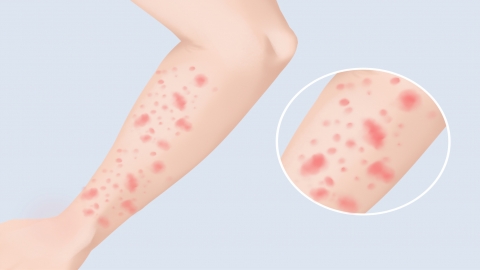What should I do if my skin is allergic?
Skin allergies are generally caused by factors such as impaired skin barrier function, exposure to allergens, contact dermatitis, eczema, or urticaria. It is recommended to seek medical attention promptly, identify the underlying cause, and under a doctor's guidance, improve symptoms through general management, medication, and other approaches. Specific analyses are as follows:

1. Impaired skin barrier function: Excessive cleansing or frequent use of irritating skincare products can thin the skin barrier, reducing its ability to resist external irritants and making it prone to allergic reactions, which manifest as redness and itching. Use mild, soap-free cleansers in daily routines, avoid washing with hot water, choose moisturizers containing ceramides to repair the barrier, and reduce the number of different skincare products used.
2. Exposure to allergens: Contact with pollen, dust mites, animal hair, or allergenic ingredients in cosmetics may trigger an immune system misjudgment leading to allergic reactions, resulting in rashes and flaking. Identify and avoid allergens promptly, wear masks when going outdoors, switch to medical skincare products with simple ingredients, and regularly clean indoor environments to reduce dust mite proliferation.
3. Contact dermatitis: After skin comes into contact with irritants or allergens such as detergents or metal jewelry, localized redness, blisters, and itching may occur, representing a mild allergic condition. Patients should follow medical advice to apply topical medications such as hydrocortisone butyrate cream, desonide cream, or mometasone furoate gel to affected areas.
4. Eczema: In patients with chronic eczema, acute flare-ups may occur upon external stimulation, causing dense papules and oozing; allergic symptoms are more widespread than in contact dermatitis. Oral antihistamines such as loratadine tablets, cetirizine hydrochloride drops, or ebastine capsules should be taken as directed by a physician.
5. Urticaria: Dilation of small blood vessels in the skin and mucous membranes leads to hives accompanied by intense itching, which may spread throughout the body and represents a more urgent allergic condition compared to eczema. Treatment should follow medical guidance using medications such as fexofenadine hydrochloride tablets, acrivastine capsules, or desloratadine dry suspension.
In daily life, avoid spicy, irritating foods and alcohol, wear loose, breathable cotton clothing to minimize skin friction. Maintain a comfortable indoor temperature, avoiding extremes of heat or cold, and adopt comprehensive skincare practices to alleviate allergy discomfort and promote skin health.









